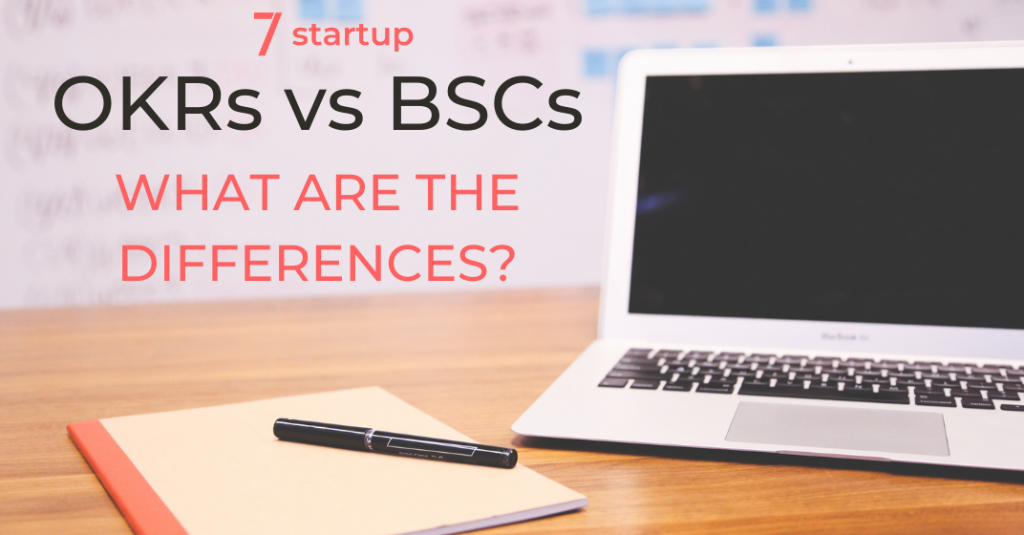Both an OKR framework and BSCs (Balance Scorecards) are change-inducing systems for a startup. They both aim to clearly define what a startup is attempting to accomplish, connect the departmental activity with strategy, and track all strategic progress toward pre-determined goals.
While OKRs and BSCs have lots of similarities in terms of aim, they still have a lot of differences in terms of strategy and general tactics for attaining the goal.
What is an OKR framework?
The structure for creating and tracking objectives and their accomplishments is called objectives and key results. The strategy and execution are broken down into two parts: objectives and key results. In other words, you establish ambitious goals and then plan how to achieve them. OKRs purpose is to help a startup outline how to reach goals by taking real, explicit, and quantifiable steps.

What is a Balanced Scorecard (BSC)?
In the 1990s, the Balanced Scorecard became a prominent strategic framework for translating strategic objectives into results. The framework was created by Robert S. Kaplan and David P. Norton and is still a popular strategic management paradigm for startups today.
The BSC is a four-part strategy framework that outlines a startup’s key strategic priorities. ‘Finance’, ‘Customers’, ‘Internal Processes’, and ‘Learning & Growth’ are the four viewpoint titles that are important to a startup’s performance management. A BSC is meant to help the entire startup explain its primary objectives, initiatives, and metrics in each of these four areas. It’s a tool for managing the performance of a startup.
For decades, the BSC has been a popular management tool, with many successful using this framework to outline and express their strategic business goals. Kaplan and Norton also went on to propose a ‘Strategy Map’ as a tool to help in the development and execution of the BSC approach.

An example strategy map. Image from Intrafocus
What are the differences between OKRs and BSCs?
Both frameworks have a lot in common. However, they do have certain distinguishing characteristics.
Cadence
Most startups write objectives and measurements for their BSCs that they intend to last at least a year, if not longer. Most businesses, on the other hand, update their OKR framework every quarter and concentrate on what may add the most value in the following 90 days.
Creation Parameters
Organisations set objectives and measurements in four separate but linked perspectives of performance when creating a BSC: financial, customer, internal processes, and learning and growth. OKRs, on the other hand, aren’t based on views. The focus is once again on what’s most essential in the coming quarter.
Frequency of Use
The OKR framework is done on a more frequent basis. BSCs are typically performed once a year. OKRs, on the other hand, are usually reviewed and updated quarterly, if not regularly. A quarterly assessment of aims and outcomes is often far more sensible in today’s fast-paced corporate environment.
Intentions of Goal-Setting
OKRs encourage teams to be more ambitious. Within OKRs, being ready to fail is a key notion. Instead of creating objectives that are easy to attain, the aim is to set goals that are bold and inspiring. If you just obtain some of the important achievements with the OKR framework, that’s OK; you’ve still accomplished more than you would have without the lofty aim. Using BSCs, on the other hand, requires teams to meet all given objectives.
Performance-related Pay
OKRs have nothing to do with compensation or bonuses. The separation of OKRs from remuneration and incentives is a positive thing. BSCs, on the other hand, is frequently related to remuneration and bonuses, but only to a limited extent. I very often tell my clients to keep performance indicators and paycheques separate.
OKRs or BSC?
Both Objective and Key Results (OKRs) and Balance Scorecards (BSCs) are useful in their own ways. We all know that things are changing quicker than ever, therefore having measurements that allow us to be flexible in our approach is critical, and this is something OKR frameworks excel at.
Startups using the OKR framework may use the Balanced Scorecards to assess their existing OKRs for excessive focus as well as renegotiate current OKRs to ensure they are taking a balanced approach to their performance. OKRs also increase operational agility for businesses using the BSC framework enhancing how employees integrate their strategic intent.
These tools aren’t like a piece of software that you install and then use. Both require care, as well as cultural integration. As a result, someone (or a group, depending on the size of the business) must continue to control the process. Don’t be afraid to test out both frameworks to see what works best for your business and your team.
Tags: Startup funding, venture capital, HR for startups, scaleups, fundraising, pitch deck review, OKRs, BSC, balance scorecards




